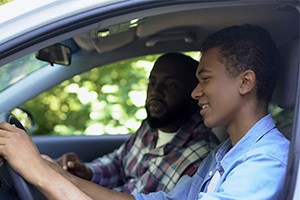
Getting your driver’s licence is an exciting step toward independence and adulthood, but it’s also a big responsibility. It’s essential that you balance your new-found freedom with caution and safe behavior. Remember, what you do behind the wheel not only affects you but your passengers and other drivers on the road, too. We’ve compiled a few tips to help you stay safe and have fun on the road on your own.
1. Obey All Traffic Rules. From road signs to right-of-way, it’s crucial to obey traffic laws and other driving laws to prevent motor vehicle crash-related deaths and injuries.
2. Slow Down. There are multiple reasons as to why you shouldn’t speed. First off, the faster you’re driving, the less time you have to stop your car, and the worse any impact and subsequent injuries will be. Also, speeding impedes the effectiveness of vehicle safety equipment.
3. Keep Up With Car Maintenance. Regular maintenance can help you avoid breakdowns and other potentially dangerous accidents. This includes oil changes, checking tire pressure, tire rotation, checking brake fluid and coolant levels, and filling up your gas tank before it gets too close to “E.”
4. Always Wear Your Seatbelt. Seatbelts save lives. Always buckle up before heading to your destination, and make sure your passengers wear theirs too.
5. Avoid Distractions. We’re sure you’ve heard this before, but it’s essential to keep your eyes on the road. That means no cellphone use, no eating, and no turning away to chat with friends. Accidents can happen in a split second. However, if you’re paying attention to the road, you’ll have a better chance of avoiding one.
6. Make Adjustments Before You Go. You shouldn’t even think about hitting the road before making adjustments to your seat, steering wheel, or mirrors. Taking your attention off driving to adjust yourself increases your risk of an accident.
7. Check the Weather. Rain, sleet, and snow can all make driving more difficult and dangerous. If the conditions are too treacherous for you as a new driver, it’s better to stay off the roads.
8. Never Drive Under the Influence. Just don’t. This includes being under the influence of alcohol, drugs, or lack of sleep.
9. Learn How To Respond to Police. No driver wants to get pulled over by the police. How you deal with law enforcement may seem obvious, but it’s important to know what paperwork you’ll be expected to have on you and what your rights are. When you see red lights flashing behind you, don’t speed up or do something reckless. Safely pull off on the side of the road, turn off your car and roll the window down while keeping your hands visible. Always be polite, and do what the cop asks of you, and you will soon be on your way again.
10. Know What to Do After An Accident. After safely moving out of traffic, call the police to report the accident as soon as possible. Make sure nobody is injured in either vehicle, then exchange insurance information with the other driver. Don’t make any claims as to who is at fault to the police or the other driver. Use your cellphone camera to take pictures, and take notes of what happened.
11. Don’t Succumb to Peer Pressure. It’s only natural that you will be keen to give your friends a ride to school or take them out once you have passed your driving test. Nevertheless, politicians have suggested that newly licensed young drivers shouldn’t be allowed to have passengers their age because the adverse effects of peer pressure have resulted in so many serious accidents. Don’t give in to peer pressure to drive too fast, take risks, or drive under the influence.
12. Always Be Prepared. In case of accidents, breakdowns, or other emergencies, your car should always contain important driving documents and an emergency kit with everything you’d need for an extended time in your vehicle.
Tips for Parents of New Drivers
Parents can take on new levels of stress as their children reach the driving age. Here are some tips to help parents guide their teens as they advance from a supervised learner to an independent driver:
Co-develop Driving Rules. Parents should work together with teens to establish rules for driving. This includes no texting or talking while driving or driving while intoxicated. Please make sure they are aware of the consequences of not following them. Teens and parents should understand that laws are about safety, not control.
Control the Keys. Having to ask to use the car allows teens and parents to talk about plans for driving, where they’re going, who they’ll be with, and when they’ll be back.
Encourage Open Communication. To keep teens safe, setting rules, asking questions, and watching closely, sometimes called “monitoring,” is essential but not always enough. When rules are being set, teens want to hear and deserve to know the rules’ reasons. It’s important to remind them that you’re setting rules for their safety and not to control their lives. Parents should listen and be receptive to a teen’s concerns, which are often quite practical and solvable. When teens want to get out of unsafe situations with their friends, parents can be the scapegoat for their safe choices.
We’re Passionate About Your Safety
Keeping your teen safe on the roads starts with practicing safe driving yourself. Unfortunately, collisions are not always avoidable. If you or your child were injured in an accident, you’ll need the help of a trusted personal injury lawyer in Ontario. Here at Cariati Law, our experienced team can help. Contact us today for a consultation. Fill out the form below or call us at 905-629-8040.
